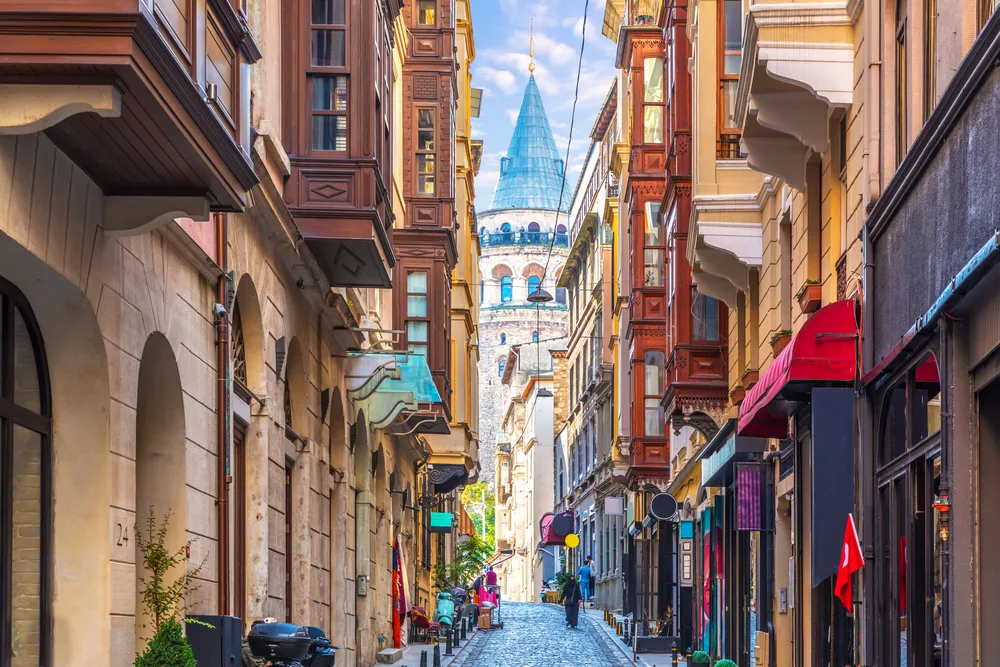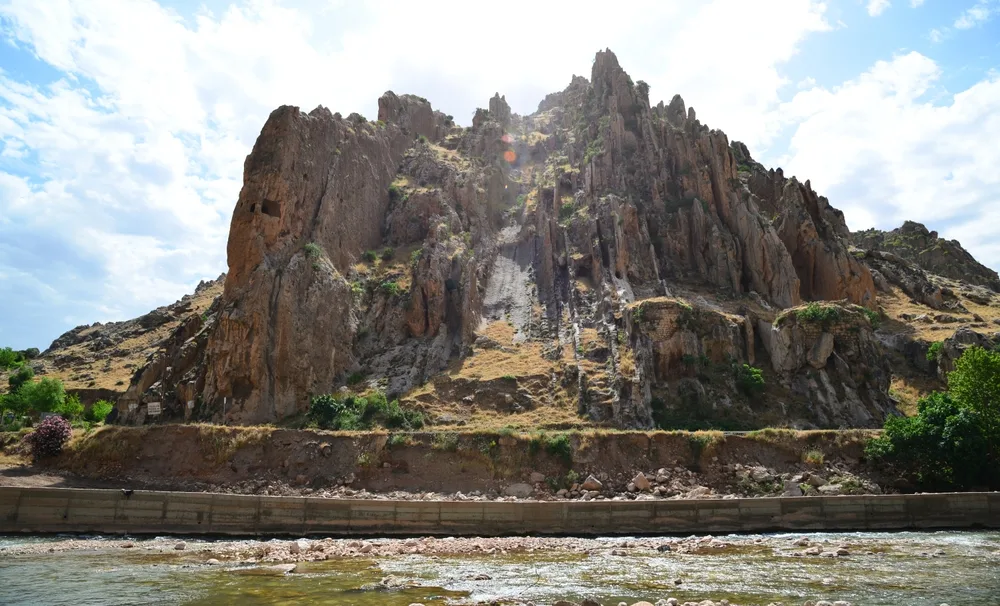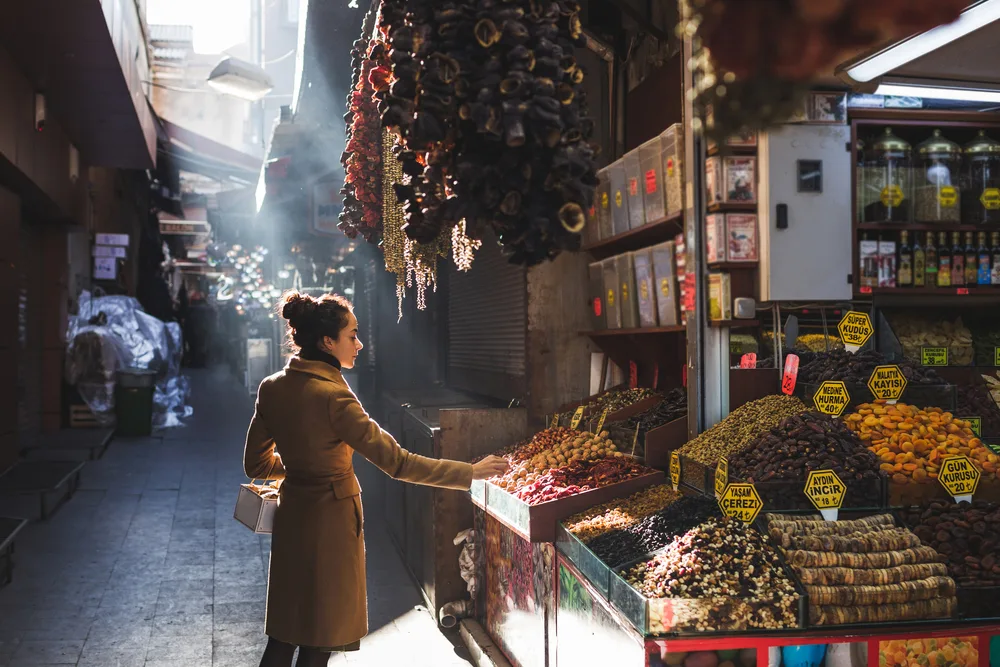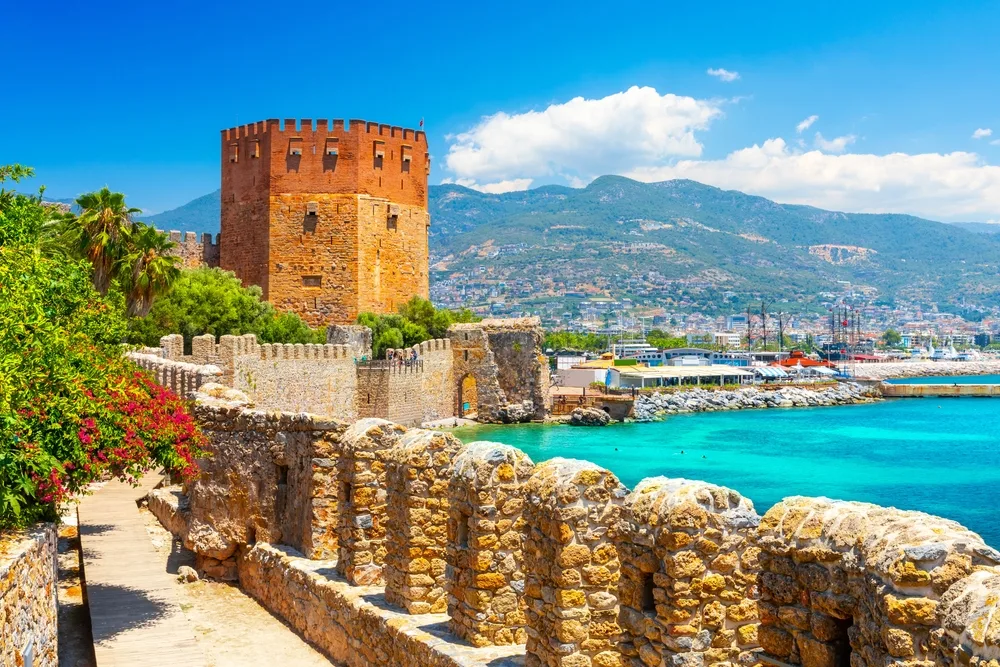The country of Turkey has so much to offer visitors, from exotic cities to sparkling Mediterranean coastline to lunar landscapes. It’s no wonder that it received an estimated 45 million tourists in 2022.
Turkey has thousands of years of history, and nowhere is this more visible than the stunning city of Istanbul, which was the seat of multiple empires from its position at the crossroads of Europe and Asia.
There are so many sights in Istanbul alone, from the Ottoman glory of the Topkapi Palace to the Hagia Sophia, which started its life as a Byzantine cathedral.
There is a lot to see outside of Istanbul. Many visitors flock to the spectacular landscapes and famous hot air balloons of Cappadocia. Others relax on Turkey’s wonderful beaches in resort areas such as Bodrum.
But while the country is rich in history, culture, and amazing sights to see, is Turkey safe to visit? Here’s our take.
Is Turkey Safe to Visit in 2025?

Lepneva Irina/Shutterstock
Yes and no. While Turkey is mostly safe to visit, you definitely need plenty of caution as you move around the country.
The primary threat to visitors comes from notoriously high levels of petty crime, especially in Istanbul. The country also has other problems, such as political unrest, threats of terrorism, and even natural disasters.
Problems that a visitor might encounter include:
- Pickpocketing
- Bag snatching
- Scams
- Robbery
- Civil unrest
- Terrorist attacks
- Earthquakes
Obviously not all of those things will happen during your trip to Turkey (that would certainly be an eventful vacation). However, there is a risk of all of these events in Turkey.
A safe traveler is also a well-informed one, which is why it is important to know about the things you might encounter even if the risk of them happening is very low. Most countries advise their citizens to exercise increased caution.
In its travel advisory, the Irish government tells its citizens to exercise increased caution due to earthquakes and political unrest, especially in provinces near the Syrian border and in Kurdish majority areas.
The New Zealand government also advises its citizens to exercise increased caution while in Turkey, and advises visitors not to travel or to avoid non-essential travel to certain areas.
It lists many of the same reasons other countries do for advising caution, such as terrorism, the unstable political situation, and civil unrest. Not all of the risks of traveling are the country’s fault, as it has the misfortune of being in a volatile geopolitical area.
The country borders Syria in the southeast. Syria has been engulfed in a civil war for about a decade, which has affected neighboring Turkey.
Instability and conflict sometimes spill over in border areas, which is why most governments advise their citizens against travel to the border. Turkey’s southeast is also home to a large Kurdish population.
The Kurds are a national minority without their own nation-state, and the relationship between this ethnic group and the Turkish state has always been difficult.
Tensions have increased in the past few years as the Turkish state became increasingly repressive against the Kurdish population, using the justification of fighting the militant Kurdish party PKK, which the state officially classifies as terrorists.
The result has been a tense situation in many Kurdish-majority areas such as Diyarbakir. Government raids are common as are protests and demonstrations against what many locals perceive as repressive government policy.
Many foreign governments advise their citizens against non-essential travel to provinces that have been caught up in the unrest. Demonstrations can happen in other parts of the country, especially major cities such as Istanbul and Ankara.
The Turkish government is fairly repressive when it comes to political opponents, and it often reacts to protests with violence and arbitrary arrests.
For example, the Turkish police detained over 100 people at Istanbul Pride in June 2023. Due to the tense political situation and the fact that protests can turn violent, it’s a good idea to avoid any demonstrations while you are visiting.
The U.S. State Department also warns citizens that they are at risk of arbitrary detention, so it’s probably a good idea not to do anything that the government might interpret as being too critical while you are in the country.
There is also the major risk of terrorism. Most terrorist attacks occur in the southeast, which is the region with the most turbulent political situation, and attacks tend to target Turkish security personnel.
In the southeast, terrorist groups have kidnapped foreigners residing in Turkey. Although these groups usually target aid workers and other professionals, not tourists, you should still avoid traveling to the Syrian border.
Terrorist attacks have occurred in big cities such as Istanbul and Ankara before, and crowded places with plenty of people, including tourists, were targeted.
The UK government advises its citizens to be careful in crowds, follow any advice from local authorities, and be particularly careful on important anniversaries when terrorists tend to strike.
Finally, it’s impossible to talk about the safety of traveling to Turkey without mentioning earthquakes, as the country lies in an active seismic zone.
In February 2023, Turkey and Syria were hit by a devastating earthquake that killed about 50,000 people and destroyed much of southeastern Turkey. Many people wondered if Turkey was safe to visit after the earthquake.
Most of the country is still safe to visit, and in fact many local Turks hope that people will visit as the economy desperately needs tourism dollars to recover after the disaster.
However, avoid the provinces that were most devastated by the earthquake as the infrastructure still hasn’t been rebuilt. Read up on emergency measures you can take to protect yourself during an earthquake, such as seeking cover, so you can prepare if there is another one.
Ready to Book?
Unlock Exclusive Discounts on Expedia.com!
Got Travel Insurance?
Protect yourself for unexpected interruptions.
Compare Plans We may be compensated when you book after clicking on one of our links.Crime in Turkey

AlexAnton/Shutterstock
Crime is probably the primary concern for many visitors that are planning a trip to Turkey. Crime is far more likely to affect the average tourist than more abstract concerns such as the country’s tumultuous politics.
Plus, based on blogs and experiences of previous travelers, Turkey has a reputation for crime. However, the crime situation is not as bad as you may think.
The violent crime rate in the country is fairly low. According to the World Bank, the homicide rate is 3 incidents per 100,000 people, a relatively low rate for such a densely populated country.
It does have some problems with organized crime, particularly with loose criminal networks in border areas and with mafia-style organizations that have strong ties to the government. However, these groups are almost never interested in tourists.
It’s a good idea to base your concerns for your own safety in Turkey on what residents and expats say. According to Numbeo’s survey data, Turkey has a moderate score of 41.62 out of 100 on the crime index.
Respondents are most concerned about petty crimes such as verbal harassment, petty theft, and the ever-present corruption and bribery.
Petty Theft
The most common crime affecting tourists in Turkey is absolutely petty theft. Most crimes you will encounter are crimes of opportunity such as pickpocketing, bag snatching, and scams.
The Australian government cites the risk of petty theft in its travel advisory for Turkey. Istanbul is the most common location for theft, especially popular tourist attractions such as Taksim Square, Sultan Ahmet Mosque, and the Grand Bazaar.
Pickpocketing also happens in public transportation and in other areas around Turkey. Always make sure that your valuables are close to your body.
Put your passport and wallet in an inner jacket pocket or front pants pocket. Only wear cross-body bags that are hard to snatch. Physically hold your bag close to you in crowded areas such as the Istanbul metro.
Beware of common scams such as taxi drivers. Only take official taxis and make sure that your taxi driver turns on the meter. Many people come to Turkey for souvenir shopping.
Before buying any expensive purchase, such as an authentic Turkish carpet, research the dealer thoroughly as there have been people trying to pass off fakes for high prices.
Assault
Although violent crime against tourists is rare, assaults sometimes happen. The Canadian government warns travelers about the risk of drink spiking.
Both men and women have been spiked, especially in popular resort areas, then robbed or assaulted. Never accept anything from strangers or leave your drink unattended.
Men are often targeted by criminals who pose as well-dressed young men and invite tourists for a night out. Then, they rack up a bill sometimes in the thousands of dollars and force the visitor to pay under threat of violence.
People have been assaulted before for refusing. Turks are generally friendly but be careful if someone seems too friendly. Women are at extra risk of sexual assault.
The UK government warns about the prevalence of sexual assault in Turkey’s coastal resort areas.
Women alone should be extra vigilant, especially when meeting friendly locals including resort workers. Never go to toilets alone, and especially don’t let any young girls in your party go to the bathroom alone as assaults have happened there.
Avoiding Bad Areas

SinDogan34/Shutterstock
You want to avoid parts of Turkey where geopolitical strife is worse, which is usually in the southeast. Avoid all areas along the Syrian border as unrest often spills over.
Be very careful or avoid traveling to provinces in the southeast that experience unrest, such as:
- Hakkari
- Sirnak
- Kilis
- Siirt
Also avoid travel to areas that were devastated by the earthquake, such as:
- Diyarbakir
- Hatay
- Elazig
You can only travel to Mount Ararat with a government-appointed guide due to the tense border situation with Armenia.
Things to Consider

Breslavtsev Oleg/Shutterstock
Here are a few additional safety tips for visiting Turkey:
- Do not insult the Turkish flag, state, or its founder, Ataturk. This is illegal by Turkish law. Also avoid expressing an opinion on subjects that are controversial in the country, such as the religion of Islam, the partition of Cyprus, Armenian genocide, or Kurds, as you don’t want to offend locals.
- Some parts of Turkey are very secular, while others are conservative. When visiting more conservative areas of the country, dress modestly and avoid drinking alcohol in public.
- Verbal and sexual harassment of women can happen. If someone touches you, shout for help as that will scare them away. Men will sometimes approach foreign women assuming they are prostitutes, so definitively rebuff any advances like that.
- Turkey is a popular destination for medical tourism, but thoroughly research potential providers ahead of time. Many people have suffered bad side effects from surgical procedures in the country. Doctors may not be vetted to the same standards as they are back home.
Frequently Asked Questions

Prosign/Shutterstock
Here are a few common questions people ask before visiting Turkey:
Is it safe to go to Turkey right now?
It is safe to go to Turkey right now, although some regions that used to be popular tourist destinations are now not safe to visit due to the earthquake. However, you will need to take some safety precautions.
Is it safe to go to Istanbul now?
Yes, it is safe to go to Istanbul now. However, petty crime rates are still high, so make sure you keep a close eye (and a close grip) on your valuables at all times.
Is it safe to travel to Turkey now after the earthquake?
It is not safe to travel to regions that were heavily affected by the earthquake as the infrastructure is still completely destroyed. However, Turkey is a massive country and most of it was not affected by the quake at all.
Can I wear jeans in Turkey?
Yes, you can wear jeans in Turkey, and they are a popular staple among locals. The only exception is if you get invited to a wedding, when guests are expected to dress up.
Where is the safest place in Turkey?
Turkey’s smaller cities away from the southeast are the safest places in the country. This includes places such as Izmir, Bursa, and Fethiye.
So, Is Turkey Safe to Visit?
Although travelers to Turkey need to exercise some precautions, overall, the country is safe to visit. Just do your research ahead of time, especially on locations specific to your itinerary, and always keep a close grip on your valuables.
So, with so much to see and do, what are you waiting for — book your trip today and experience for yourself all that Turkey has to offer. Happy travels!






